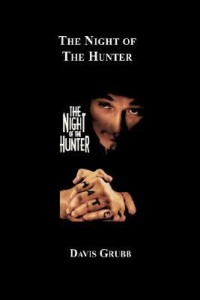 This mid-century, noirish psychological thriller has something in common with The Maltese Falcon. Both stories feature a classic “MacGuffin,” an arbitrary object of desire that all parties seek, pursuit of which drives the action of the story. The tale also has a Lolita-like element in that the bad guy cynically marries a widowed woman just to get close to her kids who seem to know where the MacGuffin is.
This mid-century, noirish psychological thriller has something in common with The Maltese Falcon. Both stories feature a classic “MacGuffin,” an arbitrary object of desire that all parties seek, pursuit of which drives the action of the story. The tale also has a Lolita-like element in that the bad guy cynically marries a widowed woman just to get close to her kids who seem to know where the MacGuffin is.
In this case, the MacGuffin is ten thousand bucks, an astronomical sum in the Depression-era, rural south (possibly West Virginia). The guy who stole it, for reasons unknown, has been executed but the money never was recovered. He apparently didn’t tell his widow what he did with it, but the children may know. The boy, John, is nine and the girl is four. The story is told mostly from John’s point of view although plenty of promiscuous head-hopping mixes it up a bit (and often mixes up the reader as well).
An evil, pseudo-preacher comes to town in search of the money. Actually he was a cellmate of the thief before his execution and that’s how he learned of the cash cache. He’s a reasonably interesting character, a cold-blooded mustache-twirler with a less-than-convincing, reactionary superego reminiscent of Flannery O’Connor (e.g., Wise Blood). He goes to strip shows in order to “inform himself” about the moral depravity of “whoredom.”
The false preacher charms the widow and presses the children to reveal where the money is hidden. The boy, John, smells a rat and tries to protect his little sister. As the preacher’s threats escalate, the children flee into an implausible cross-country chase. Finally there is a white-vs-black-hat showdown with predictable results.
I found the plotting formulaic and the characters two-dimensional, and was never gripped by the story, which did not seem believable except for the old Southern Gothic trick of making the characters so stupid and gullible that anything should be believed, which is why I don’t enjoy southern gothic.
The main problem is the boy, John, who shares his thoughts, intuitions, judgments, and speculations with the reader throughout. More than precocious, this undereducated, rural nine-year-old has the mental capacity of a university professor, whether told in his own words or by the ubiquitous and intrusive 3P-close narrator. (“John got to his feet, knowing suddenly how lost it all was: what a world had failed him, how deep a night when the last lamp of all went flickering down in the darkness.” p. 134). I just never bought that character.
Major structural problems in the story are two. One, the setup is that the boy knows where the money is, due to a mano-a-mano talk with dad before he got caught. The secret is John’s sacred honor, sworn to his father. The reader is not told where the money is. That makes the boy a noble character and informs the reader that his cat-and-mouse with the preacher is strategic. But then the location of the money is revealed to the reader before the midpoint and all the steam is let out of that engine. That strikes me as a writing error.
The second structural problem is that suddenly, also around the midpoint, we are told that the girl, Pearl, also knows where the money is. That undercuts the status and motivation of the boy, because the girl is too young to understand the significance of the money or the meaning of a secret, or indeed, what’s at stake in the story. She doesn’t even know that her father is dead. John suddenly has little control over the big, dark secret that is supposed to be driving the whole plot. So after that point, there is no point.
This book is enormously popular with readers and was nominated for a National Book Award. That may be because of the successful movie of the same name that came out in 1955, which I haven’t seen. So I recognize that my lukewarm-to-negative take on this book is a minority opinion. I see the novel as a refuge of sentimentalism, which most people enjoy but which I dislike.
Grubb’s writing is sometimes interesting, although the lack of quotation marks and paragraph breaks, and the incessant, undocumented POV head-hopping all make it a more difficult read than it needed to be. Sometimes the prose tips over into purple territory (“And in that new, pale proscenium of light John saw again the dancers, the black horse prancing and the brave little soldier and the clown with his toothpick legs.” p. 196).
But there are also some fine descriptions to be appreciated (“The trip to New Economy with the week’s butter and eggs was the great event toward which each of the seven other days moved.” p. 158).
The last twenty pages of the novel give up all pretense of dramatic story-telling and the heavy-handed narrator simply recites the ending in a tedious torrent of exposition that robs the finale of any force.
Grubb, Davis (1953). The Night of the Hunter. Blackmask.com (200 pp).
